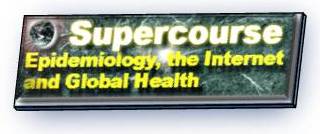Search for most updated materials
| Supercourse Overview Front Page |
Supercourse does not grant degrees or certificates, but is designed to be a resources for teachers, professors, and other educators. Supercourse does not provide access to faculty members developing the modules.

Question: What is the best way to improve health training/research?
Answer: Improve the lectures.
Question: How do we improve health training/research lectures:
Answer: Have faculty worldwide share their lectures:
Question: Will faculty share lectures?
Answer: Yes, The Supercourse has 65,000 faculty from 174 countries who created a Library of Lectures with
4750 outstanding lectures on the Internet. In the last 12 months we taught over 1 million students world wide. Our H1N1 lecture was seen by 40,000,000.
We were originally funded three times by NASA, and by the National Library of Medicine. We have built a “Library of Lectures” with passionate scientific lectures from across the world. We have developed a technology for inexpensive, sustainable global training. Our program consists of:
1. Open Source: Our Global faculty shares their best, slides/lectures on prevention. The experienced faculty member can beef up their lectures. New instructors reduce preparation time with better lectures. Faculty in developing countries have current prevention information.
2. “Empower” Educators: Teachers world wide create their own lectures. We aid them providing top quality slides and lectures.
3. Faculty: Twenty Nobel Prize winners, 60 IOM members and other top people contributed lectures by Sept. 1. Gil Omenn, AAAS, Vint Cerf, the father of the Internet, Elias Zerhouni, head of NIH, etc. contributed lectures. One average, each faculty member has published over 100 article, and the majority are professors at major universities world wide.
4. Mirrored Servers and CDs: We have 45 mirrored servers in Egypt, Sudan, China, Mongolia and others. We have distributed 20,000 Supercourse CDs
5. JIT Lectures: We created scholarly disaster lectures within days after the Bam Earthquake, Rita, Pakistan Earthquake, Haiti and Avian Flu and reached >200,000. Over 40,000,000 people saw our H1A1 lecture. These are the highest rated disaster lectures
6. Legacy Lectures: We are collecting the best of the best lectures from Nobel Prize winners, members of the IOM, and NAS.
7. Library of Alexandria Supercourse of Science: We are collecting the best lectures of science In the next year there will be over 1.5 million lectures.
8. Islamic Supercourse: We have been capturing lectures from Islamic scholars on prevention and Islam. It also serves as a form of “healthy diplomacy”
9. Reaching Every Medical student and faculty: We are collaborating with WHO and the Library of Alexandria. We will be reaching and teaching over 3 million medical school faculty and students world wide about global health and prevention.
Productivity: We have published over 150 papers in leading medical journals including Science, Nature, Lancet, BMJ, Nature Medicine, PNAS among others. Our web pages have been identified as in the top 100 by PC Magazine, and one of the top web pages by Science magazine.. We receive 75-100 million hits a year. We are one of the top ranked sites in health.
If you are interested in joining our effort please come to our home page to sign up. How to Join the Supercourse Faculty?
Best regards from Ron Laporte, Ph.D., Director, WHO Collaborating Center, Professor of Epidemiology in Pittsburgh and the Library of Alexander
The Supercourse will never knowingly publish political, sexual and religious slides/lectures. We will not publish lectures which have no scientific merit. Please let us know if you identify problems such as these in the Supercourse materials - mailto:super1@pitt.edu
All participating authors acknowledge that the information contained in their submissions is accurate when submitted, their lecture will be shareware to be used and shared by others. The Authors maintain their copyright and can remove or change their lectures at any point. The opinions expressed in the lecture are those of the authors and not necessarily those of their institutions or the Supercourse. As the authors retain copyright, they are responsible for the content of their lectures.
All Supercourse lectures cannot be privatized or sold. While authors maintain the copyright, they provide their lectures with an understanding that anybody can use their lectures to enhance their teaching.
Supercourse Team is supported GNU Free Documentation License.
Text in Supercourse, excluding quotations, has been released under the GNU Free Documentation License (or is in the public domain), and can therefore be reused only if you release any derived work under the GFDL. This requires that, among other things, you attribute the authors and allow others to freely copy your work.
URLs of the lectures were harvested through advanced search algorithms but that not all the content were reviewed.
The GNU Free Documentation License (GNU FDL or simply GFDL) is a copyleft license for free documentation, designed by the Free Software Foundation (FSF) for the GNU Project (http://en.wikipedia.org/wiki/GNU_Free_Documentation_License).
Search inside of Supercourse and lectures in HTML and PPT format